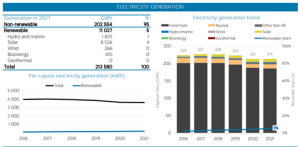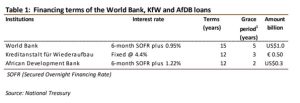Two key issues for South Africa at COP28 climate summit in Dubai
SHARE THIS PAGE!
As the South African delegation attends the 28th Conference of the Parties, the annual global summit on climate change, in Dubai, which begins on Wednesday, there are two issues to consider:
One is that as a country we are heavily dependent on electricity generated from fossil fuels. Although we emit significantly fewer greenhouse gases than major industrialised nations, this is still our biggest problem if we are serious about contributing to the global fight to limit the rise in the Earth’s temperature to 1.5˚C above pre-industrial averages.
The second is money. South Africa was the first country to benefit from the Just Energy Transition Partnership (JET-P), in which rich countries agreed to help finance the transition to a low-carbon and resilient economy. Other countries that have since joined the programme include Indonesia, Vietnam, India and Senegal.
These two things are inextricably interlinked, because the financing South Africa gets will be used almost exclusively to fund the move to renewable energy, and the reskilling of workers that it will require.
To illustrate just how large a task it is, here are the comparisons contained in the most recent Eskom annual report.

95% of South Africa’s electricity generation comes from non-renewable sources. But there is a slow increase in the amount of renewable energy capacity available. Most of that has been in solar power.
There is a certain irony in the fact that COP 28 is taking place in the oil-rich United Arab Emirates, under the presidency of Sultan Al Jaber, who is also the CEO of the Abu Dhabi National Oil Company. But an understanding presidency may make life a little easier for Africa’s negotiators.
South Africa’s chief negotiator Maesela Kekane says adequate and appropriate climate finance, quantified according to need, to implement adaptation and mitigation will be a key negotiating point. The most important part of this is adaptation, which is key to the survival of Africa’s developing economies.
Kekane will be working alongside the African Group of Negotiators, a group led by Ephraim Shitima, the Zambian Director of the Department of Green Economy and Climate Change. Their big push at COP 28 will be to finalise the Global Goal on Adaptation.
Developed countries need clear adaptation targets, and this will help with tracking, resource mobilisation and the push (from South Africa) for a 50% increase in funding for resilience. So far, the focus has largely been on mitigation.
Kekane will work alongside the African Group of Negotiators, a group headed by Ephraim Shitima, who is the Zambian director of the Department of Green Economy and Climate Change. Their big push at COP 28 will be on the finalisation of the Global Goal on Adaptation. Developed countries need clear adaptation targets, and this will aid tracking, the mobilization of resources, and the push (from South Africa) for an increase of 50% in funding for resilience. The focus has thus far been largely on mitigation.
The US Environmental Protection Agency’s recent Adaptation Gap Report says the adaptation finance needs of developing countries are 10-18 times as big as international public finance flows.
An estimated US$387 billion per year is needed to finance domestic adaptation priorities. Despite these needs, official multilateral and bilateral adaptation finance flows to developing countries are projected to decline by 15% to US$21 billion in 2021. This translates into a current adaptation finance gap estimated at US$194-366 billion per year. At the same time, adaptation planning and implementation appear to be plateauing.
National Treasury confirmed this week that South Africa has signed loan agreements for concessional financing with the World Bank, the government of Germany and the African Development Bank. Treasury says these help diversify its funding mix and also enable it to raise funding at affordable rates which helps reduce the government’s public debt.

But at the end of the line, a loan is money that needs repaying, albeit at better rates. South Africa, like many other developing countries in Africa, can ill afford to increase that debt. And lest we forget, it is to help lower greenhouse gas emissions, a problem created by rich countries, but one that poor countries, especially in Africa and island nations globally, have done little to create.
NYC prepares for big snowstorm
10 hours agoWe want to win Gauteng alone: Lesufi
10 hours agoThree people sentenced for defrauding RAF
10 hours agoSeveral peanut butter brands on recall
11 hours agoDollar gains as markets await US inflation data
11 hours ago